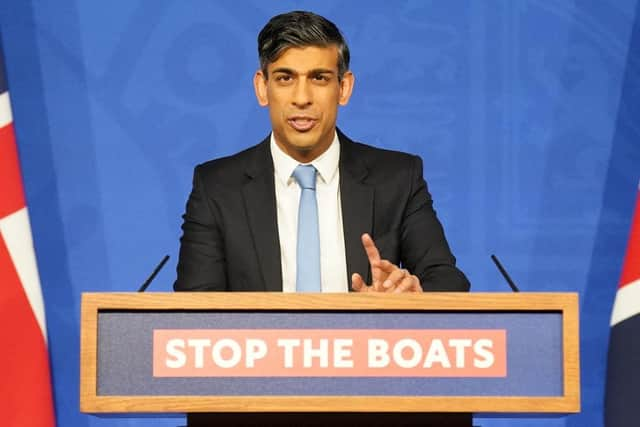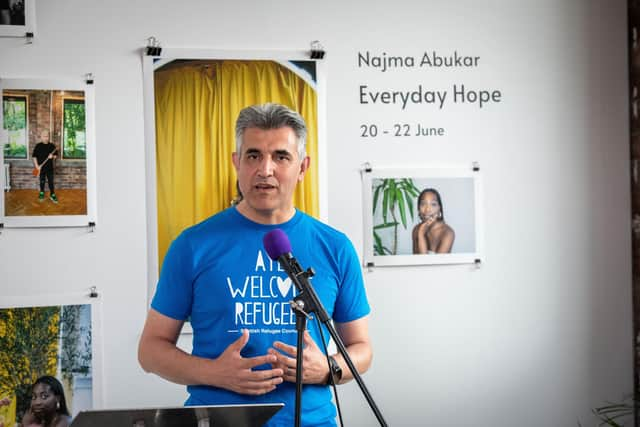Asylum seekers speak out on 'shattered lives' as Scottish Refugee Council launches campaign to overhaul system
For Liberian healthcare worker Adam*, the most difficult part about the UK asylum system has been uncertainty.
After beginning his asylum claim more than two-and-a-half years ago, he is still waiting for a decision on his case – during which time he has been unable to work.
Advertisement
Hide AdAdvertisement
Hide AdA life he had created for himself in Glasgow, through volunteer work and forging a community at his local church, came to an abrupt end when the Home Office decided to relocate him to Bradford – sending a taxi to pick him up without offering any information about where he was being sent.


"My life is shattered into pieces and I'm just trying to pick it up,” he says. “But every time you want to pick it up, a government agency or someone who does not understand what you’ve gone through, what troubles you’ve faced or what trauma you have experienced, makes a decision and time just goes into days and weeks.”
The Scottish Refugee Council (SRC) is to lobby politicians to improve conditions for people like Adam through a new campaign to reform the refugee asylum process launched this week.
The SRC’s Fair Begins Here campaign, run alongside the Together with Refugees coalition, calls for the UK government to scrap the scheme to send people who arrive in Britain through a non-legal route, such as a small boat, to Rwanda for processing; provide a proper strategy for welcoming and integrating refugees; ensure asylum claims are heard quickly and fairly, and forge stronger global co-operation to tackle the root causes that force people to flee their homes.
Adam, 27, arrived in Glasgow during a period of turmoil and threat in his life. While he does not want to give details of his situation for fear of being identified, he underwent personal persecution in the West African nation and feared for his life.


"Everything in my life in Liberia had just plummeted then,” he says. “I had no other option at that point, but to claim asylum in Scotland. I had not thought of Scotland before, I hardly knew where it was. But I could not go back, it was not safe.”
Adam worked hard to build a life and community in Glasgow, where he had undertaken courses at a local college to enhance his healthcare qualifications – and volunteered at a number of local charities, including a food bank and a charity that helps people with addiction issues.
Initially staying with a friend, Adam was devastated when he was forced to apply to the Home Office for accommodation and was told he could be moved anywhere in the UK.
Advertisement
Hide AdAdvertisement
Hide Ad"A taxi came to the door and told me I had to go,” he says. “I asked the driver where he was taking me and he said he wasn’t allowed to tell me.”
Adam did not adapt well to life in Bradford and misses his community in Glasgow.
"I went through a kind of depressive period,” he says. “[My life in Glasgow] gave me some form of purpose and it was taken away.”
After five months in Bradford, he is now back in Glasgow, where he has been able to stay with friends again and has restarted his college course. But he still does not have an answer on his asylum case. He wants to move on with his life and offer something back to Scotland – and its NHS.
"I feel like I am in chains,” he says. “I want to know I can restore what are the years that I’m missing right now being active and being productive. I know I can contribute more to the healthcare sector here in the UK.”
He wants to advocate for the UK asylum authorities to provide mental health support for people awaiting asylum claims.
"There were times when I just needed someone to talk to,” he says. “I would just break down. It would be better to provide support. [Asylum seekers] do not need to be medicated for a mental health condition they do not have, they just need people to talk to and interact with. I went through that process, being in the asylum system.”
Israel, whose wife and daughter were killed by jihadist group Boko Haram in his home country of Nigeria, feels the same. He has been waiting for four years for his asylum decision to be able to stay in Scotland. Like Adam, he spends his time volunteering and has had an interview to start a masters course.
Advertisement
Hide AdAdvertisement
Hide Ad“My four years in Scotland have changed my life,” he says. “I have a community. I’ve met some of the best people I’ve ever met.
“[But] I want the right to work. It’s driving me crazy that I can’t. It’s the same thing every day while I wait. I’m not taking benefits from anyone. I want to support myself. Right now I am just waiting without purpose.”
For Mohamed, who applied for asylum in the UK in 2019, the process was quite different.
Five years ago, the backlog of cases was shorter and claims were processed in a shorter time. According to data from a report by the House of Commons Library last year, the number of cases waiting more than six months for an initial decision has more than doubled since 2020 and increased nearly ten-fold since 2016, driven by a combination of rising numbers of applications and a slowing in the rate of processing claims.
When Mohamed returned to his home in Sudan in 2018 after completing a masters degree at the University of Aberdeen, a military coup was beginning to overthrow President Omar al-Bashir. Over the next year, more than a thousand people would be arrested and almost 250 killed in the violence that ensued.
"This is when things went downhill,” he remembers. “I had to claim asylum and I used to live in Scotland, so it made sense for me to come back here.”
His claim took just three months and he was soon able to enter the workforce in Scotland, with the help of a mentoring programme with Barclays.
Now 33, he lives in Glasgow, where he works as a data analyst and volunteers to help other Sudanese refugees who are applying for asylum, many of whom have to wait years for their cases to be decided.
Advertisement
Hide AdAdvertisement
Hide Ad"You can see the difference from when when you first meet them, the change in their personality, they almost go into a depression,” he says. “It's just the feeling that you're stuck.
"I just want to give them a friendly face and hope when they see my situation that this can come out good.”
Sabir Zazai, chief executive of Scottish Refugee Council, says the asylum process needs to be changed to allow refugees to continue their lives and contribute to Scotland while their cases are being decided.
“The majority of people want everyone to be treated with decency, and a plan for refugees that is well-managed and works for everyone,” he says.
“We need a well-functioning humane asylum system that processes cases in a timely manner. We need a better plan in place to welcome and support people in search of safety. We need to see people coming to Scotland as assets to our country and help them to realise their potential.”
- *Adam's name has been changed to protect his identity
Comments
Want to join the conversation? Please or to comment on this article.
